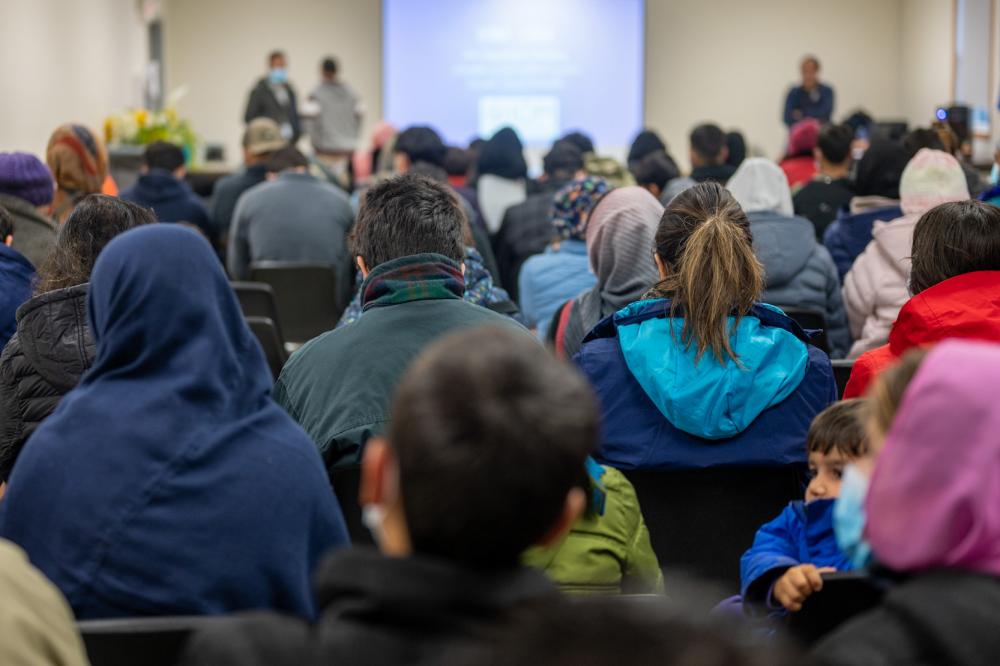Divisions in the GOP are widening, and they run right through Wisconsin. We find out what the conflict between Paul Ryan and Donald Trump means for their party here, and nationally. The refugee crisis is among the polarizing topics in the 2016 election, with President Obama calling for an increase in how many refugees are accepted into the country amid attempts by Republican lawmakers to curb the number. We talk with a journalist about a time in recent history when the United States was more welcoming to refugees. We also hear from chef Chris Kimball on his new venture Milk Street Kitchen. He discusses recipes in the charter issue of the Milk Street Kitchen magazine, including a stew that doesn’t require meat-searing.
Featured in this Show
-
America's Changing Posture Toward Refugees
President Obama recently hosted the Leaders’ Summit on Refugees, urging member states to expand their intake of refugees and dedicate more resources toward resettlement. Our guest looks at America’s changing stance toward refugees in the past decades.
-
US Immigration Policy Becomes Much Less Welcoming After 9/11, Says Editor
An editor at The Atlantic says President Barack Obama’s move to raise the number of refugees admitted into the United States represents a moderate shift in immigration policy that’s been largely unwelcoming to those seeking asylum since the 9/11 terrorist attacks.
The president pledged last month to let 110,000 refugees into the country in 2017 — up from 85,000 in 2016 — while hosting a summit of world leaders gathered in New York City for the United Nations General Assembly meeting.
The news comes as the UN reports that the global refugee situation hasn’t been this bad since World War II, with more than 65 million people displaced in 2015, up from about 60 million in 2014.
In the U.S., concerns about admitting potential terrorists into the country has made the issue a political lightning rod. Republican Donald Trump has made immigration policy the cornerstone of his presidential campaign, at one point calling for a ban on all Muslim immigrants before shifting his stance to back what he calls “extreme vetting.”
“That’s behind a lot of the backlash, particularly with Syrian refugees,” said The Atlantic’s editor Priscilla Alvarez, referring to Trump’s rhetoric on the issue. “Just last year we had more than half of the governors in the United States ask the president to halt (the admittance of Syrian refugees).”
Alvarez said the number of refugees allowed into America in recent years “pales in comparison” to not only many European nations, but also the amount the U.S. resettled in decades past.
In her reporting looking back at American refugee and resettlement policy, Alvarez found the U.S. saw large waves of immigrants from previous war eras. Congress passed its first refugee legislation in 1948 after the U.S. admitted more than a quarter of a million Europeans displaced by World War II.
The Refugee Act of 1980 passed after Vietnamese refugees flowed into the nation for six years following the Vietnam War. Alvarez said the 1980 legislation established the Office of Refugee Resettlement, which outlined the formal and rigorous process for admittance.
In the 1990s, America opened its borders for a wave of refugees displaced by the Balkan wars, including 142,000 people in 1993.
But the 2001 terrorist attacks changed everything, Alvarez said. Eager to beef up national security measures, Congress passed the USA Patriot Act, which fundamentally changed the definition of refugees and who exactly was allowed into the country. Moreover, the law had no minimal threshold to grant refugee status.
The data show new standards significantly decreased the number of refugees allowed into the U.S. Less than 30,000 refugees were accepted into the country in 2002 and 2003, according to the Pew Research Center. Alvarez compared the figure to a high of 210,000 refugees admitted in 1980.
“So then you also have a problem with who can come and who will be identified as a refugee and eligible to come into the United States as one,” Alvarez said.
Much of how the U.S. moves forward with its immigration policy is contingent on who wins the presidential election in November, Alvarez said.
-
Paul Ryan, Donald Trump And GOP Unity
Speaker of the House Paul Ryan (R-WI) has said that he will no longer support or campaign for Donald Trump. In response, the presidential candidate has gone on the attack, and RNC Chair Reince Priebus says that the party machine still stand by the nominee. We talk about what the conflict means for the GOP, especially in Wisconsin.
Episode Credits
- Rob Ferrett Host
- Veronica Rueckert Host
- Veronica Rueckert Producer
- Judith Siers-Poisson Producer
- Priscilla Alvarez Guest
- Mike Wagner Guest
Wisconsin Public Radio, © Copyright 2024, Board of Regents of the University of Wisconsin System and Wisconsin Educational Communications Board.


